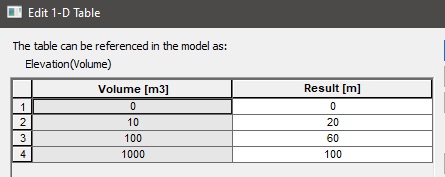Sometimes you may want to return the minimum or maximum value of the dependent variable defined in your Lookup Table.
GoldSim provides two special functions to support this. To illustrate their use, consider the following 1-D Lookup table:

The special functions that are provided require as their argument the name of the Lookup Table element A type of input element that allows you to define your input in terms of a lookup table (i.e., a response surface).. In this example, the name of the element is Elevation.
Tablemin(Elevation) would return
0 m
Tablemax(Elevation) would return
100 m
We could combine this with the Inverse Lookup functionality when referencing a Lookup Table to return the the independent variable associated with the minimum or maximum value of the dependent variable. For example,
Elevation(Tablemin(Elevation),
TBL_INVERSE) would return 0 m3
Elevation(Tablemax(Elevation),
TBL_INVERSE) would return 1000 m3 m
Note that these two functions (Tablemin and Tablemax) can be used with 1-D, 2-D and 3-D Lookup Tables.
An example model which illustrates these functions (TableFunctions.gsm) can be found in the General Examples/LookupTable folder in your GoldSim directory (accessed by selecting File | Open Example... from the main menu).
- Building a Dynamic Lookup Table
- Controlling Interpolation and Extrapolation for a Lookup Table
- Importing 1-D Lookup Table Data from a Text File
- Importing 2-D Lookup Table Data from a Text File
- Importing 3-D Lookup Table Data from a Text File
- Returning the Minimum or Maximum Value of the Dependent Variable
- Specifying Data in a 1-D Lookup Table Manually
- Specifying Data in a 2-D Lookup Table Manually
- Specifying Data in a 3-D Lookup Table Manually
- Steps for Defining a Lookup Table